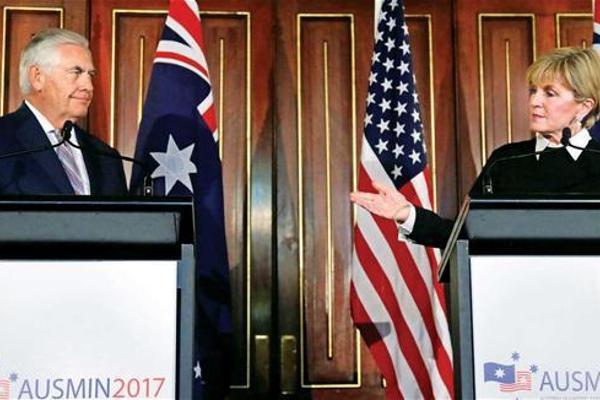Tillerson tells China to ‘step up’ on North Korea dispute
BEIJING


In the Asia-Pacific region, the United States has spent recent weeks trying to reassure allies it can maintain a tough line against China’s “militarization” of the South China Sea while at the same time seeking help from Beijing.
President Donald Trump - who frequently denounced China on the campaign trail - has turned to Beijing to help rein in ally North Korea’s weapons program, prompting concern among Asian allies that America might go easy on the South China Sea territorial dispute.
“We desire productive relationships,” Tillerson said after annual discussions with his Australian counterpart Julie Bishop in Sydney.
“But we cannot allow China to use its economic power to buy its way out of other problems, whether it’s militarizing islands in the South China Sea or failing to put appropriate pressure on North Korea.”
He said China and other regional partners should “step up” efforts to help solve the North Korea situation, because it presents a threat to the “entire world.”
China claims nearly all of the South China Sea despite partial counter-claims from Taiwan, the Philippines, Brunei, Malaysia and Vietnam.
It has rapidly built reefs into artificial islands capable of hosting military planes.
Tillerson reiterated U.S. and Australian commitment to freedom of navigation in the South China Sea to “ensure unimpeded flow of lawful commerce in a rules-based order”.
But reporters asked Tillerson if America was applying a double standard in telling countries to adhere to the international order while simultaneously pulling out of a trans-Pacific trade deal and the Paris climate accords - moves that prompted even longstanding allies to question whether America was retreating into isolationism.
“That’s why we’re here, that’s why we travel to the region, that’s why we engage with our counterparts,”
Tillerson said, standing alongside Pentagon chief Jim Mattis, Bishop and Australian Defense Minister Marise Payne.
We “travel to the region to meet with our counterparts and talk about all the issues that are important to them and hear from them concerns about where the [Trump] administration is positioned.”
